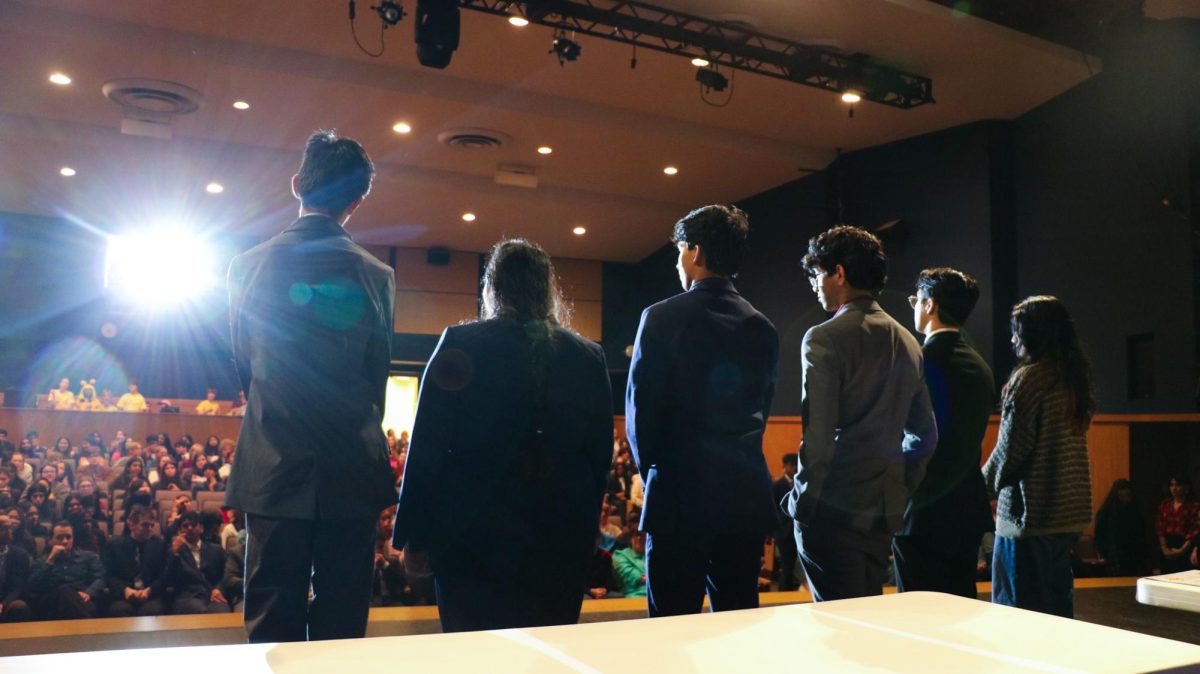
Clayton High School has many clubs, ranging from politics club to rocketry club, from Harry Potter club to baking club.  There are so many clubs, in fact, that it is entirely possible to go through school life without being aware of some clubs’ existence.
Future Problem Solving Club (FPS club for short) is one of these such clubs: membership is in the single digits, group meetings are irregular, and on the whole, the club is so low-key and focused toward one event that you’re unlikely to hear about them.
“FPS is basically a competition where you’re given two hours to complete six problem solving steps in order to solve the future scene,†freshman and club co-founder Sonya Liu said.  “The fuzzy [future scene] is an extrapolation of events into the future pertaining to the topic.â€
The lingo may be confusing, but the process is fairly straightforward. Â After identifying challenges in the future scene in 18 different categories and figuring out the underlying problem (the big picture problem), Future Problem Solvers write 16 solutions that could potentially solve the underlying problem. Â Then, they create criteria to evaluate the best solution, and then rank the top eight solutions using those criteria. Â Then, there is a three paragraph action plan describing the solution, how it solves the underlying problem, and how it relates back to the original situation that was given.
“If you want to succeed, you have to think outside the box,†Liu said.  “It’s more about flexibility.  Creativity is important, but we still have to keep within pragmatic boundaries.â€
The mission of FPS is “to develop the ability of young people globally to design and promote positive futures using critical, creative thinking.† Another goal seems to be “Teaching children how to think, not what to think.â€
There are some similarities between policy debate and future problem solving in format, but FPS isn’t a head-on competition with opponents.  “In policy you take the resolution and the affirmative team gives a plan of addressing it,†Liue said. “Then the negative team says why that plan isn’t a good plan, but FPS is more than that.  After you list challenges the plan has, you propose a counter plan based on the main challenge.  In policy you don’t have the opportunity to do that.â€
You can enter a competition in one of three categories: individual, team, and community.  In community FPS, “you get a group of four to eighteen people and you do the problem solving process for any topic,†Liu said, “and then you physically carry out the action plan.  You make a difference; it’s really cool.  Also, those groups have the most fun at internationals.â€
Liu is going to internationals this year as an individual, as is sophomore Jeffrey Cheng. Â Freshmen Julie Kim, Gabby Choo-Kang, Grace Choi, and David Kim placed fourth at the state competition. Â A team of sixth graders from Wydown also qualified for internationals.
Having qualified for internationals in 6th grade, Liu knows what the expect.  “Internationals is a four-day event in America with different events like scavenger hunts and dances.  And it has a buffet.  When they had it in Wisconsin, we had unlimited ice cream,†she adds.  “I’m really excited.  Last year I got to be the flag bearer for Missouri and I got to dress up as Sacagawea.â€
Liu recommends doing Future Problem Solving “if you’re looking for a more relaxed alternative to debate and don’t mind writing.† Meeting times are flexible and really only limited by group members’ schedules.
At the moment, FPS club operates mostly through the middle school under teachers Sandra Sermos and Linda Gwyn, who do FPS in the classroom for the class Exploratorium.
Future Problem Solving is becoming more popular, too.  “The competition is getting harder,†Liu said.  “Last year’s junior international qualifying group didn’t make it to state.  Pattonville has also started [doing FPS].â€
In a club as small as this, the members don’t do it for glory.  “We do it because it challenges us to think differently,†Liu said.  “We have to examine how our actions today affect the future, 20, 50 years further.â€

















